Scanners (’81) is a very strange movie. It’s renowned for a scene—originally supposed to open the film—wherein Michael Ironside, as the evil scanner Darryl Revok, sits on a panel before an audience and, with the power of his mind, blows up the head of a weaker scanner sitting beside him. Even when you know it’s coming, it’s shocking. You just don’t see many heads blow up in movies, then or now. There’s that one in Dawn of The Dead, and probably a few in war movies. Generally, though, heads don’t explode. It’s a shame, really. What else are heads good for?
Why is Scanners strange? For writer/director Cronenberg it’s strange in that there’s nothing sexual in it whatsoever. His first three movies—Shivers (AKA They Came From Within), Rabid, and The Brood—all featured some very twisted sexual aspects, as did Videodrome, which followed Scanners, and many others since.
So Scanners is just this straightforward science fiction movie about a small number of people born with the ability to join their nervous systems to another person’s, or, as in the film’s penultimate climax, to a computer. Which is a wonderfully absurd scene. And notion. There’s a lot of the absurd in Scanners, including some hilariously awful deadpanned dialogue.
Problem was, Cronenberg started shooting without a finished script. Or more exactly, with an as yet unwritten script, and only two weeks of preproduction. Which all had to do with an era in Canadian filmmaking known as the ‘tax shelter era,’ that’s much too boring to get into here, but the gist of it is that folks got tax breaks for investing in films, so long as those films were shot by the end of the year. Scanners—based on an early Cronenberg script called Sensitives—was given the go-ahead financially in late fall. Then started shooting almost immediately, with Cronenberg writing scenes in the early morning before shooting them later in the day. According to Cronenberg, it was a miserably difficult shoot for a movie that would require close to nine months of post-production to ensure it made any sense at all.
Does it make sense? Sure! Sort of. I mean you shouldn’t go around thinking too deeply on it, but for a weird-ass, low-budget sci-fi flick, it makes all the sense it needs to.
Scanners is creepy in a way unique to Cronenberg. By this time, his fourth movie (or fifth, if you count Fast Company, which no one’s ever seen, so let’s not), his style of directing had finally become a style. Which style is a style of no style. So to speak. It’s a very square style, very flat, colorless, formal and cold. The camera doesn’t move often, and when it does the moves are small and subtle. They are, however, purposeful. Scanners, however quickly it was made, is clearly shot with intent. But it’s not an intent that calls attention to itself. There are no beautiful shots in Scanners. No weird shadows or lighting effects. Everything is flat and visible. This is why Cronenberg’s films are often thought of as ‘scientific.’ It’s as though his actors are subjects in a lab, on display, ready to be dissected.
Cronenberg is unusual for a filmmaker coming up in the ‘70s in that his movies reference no other movies. Pretty much every great director from the ‘70s was extremely well-versed in the history of film as an art, and their movies showed it. They referenced other directors, their movies, their style of story-telling, framing shots, editing, and so on. Not Cronenberg. Watching his early movies, you’re very much watching a director inventing the craft of movie-making, as though it hadn’t already been invented. What he comes up with is entirely his own thing.
What spoke to Cronenberg wasn’t other movies, but literature. Authors like Burroughs and Ballard (books of whose—Naked Lunch and Crash, respectively—he’d eventually adapt), along with all sorts of philosophers, ancient and modern, are what inspired Cronenberg. There are a lot of filmmakers who aren’t especially good at talking about their films. Which is fine. As long as the films are great, what else needs to be said? Cronenberg is one of those directors whose dissections of his movies sometimes outshine the movies themselves. He is a smart and articulate man, well aware of, philosophically, what he’s trying to achieve in his films. The book Cronenberg On Cronenberg is a fascinating series of interviews in which Cronenberg discusses both the making and meanings of his films, in a way far more insightful than any critic ever has (myself included).
Getting back to its look, Scanners is a cold, gray movie. There are few exteriors to give it a sense of place, and those we see are almost all shiny office buildings seemingly alone in the middle of nowhere. It’s as though they’re removed from any actual city. No people are seen walking past. The idea was for the movie to be set in a near-future, but with little money and no time, these odd, displacing exteriors were his answer to the lack of special effects. What budget he had for effects was used for important matters like blowing up heads.
If you’ve ever seen the X-Men, you know the plot. Some 237 people were born as scanners, owing, we later discover, to experimental drugs given to their mothers when pregnant. Two of these scanners are especially powerful. One, Darryl Revok, intends to take over the world. He’s gathering together as many scanners who will join him, and killing those who won’t. The other, Cameron Vale (Stephen Lack), is a derelict living on the street, going mad because of what his brain is capable of, and having no memory of his past or understanding of why he is what he is.
Vale is “found” by scientist Paul Ruth (Patrick McGoohan), who knew where he was all along, and is trained to harness his powers, and eventually to hunt down and stop Revok. McGoohan works for ComSec, a company making weapons and whatnot, that originally intended to train scanners as spies.
Relationships become more complicated as the story progresses. The drug used to tamp down the scanner effects, allowing scanners to chill out now and again, is the same drug given the pregnant women who gave birth to scanners in the first place. And Revok is deeply involved in a company that manufactures the drug. A company McGoohan knows all about. Hmm. Looks like Revok is working on birthing a new army of scanners.
Revok and Vale face off at the end, in a battle of two guys making scrunchy faces and thinking super-death-thoughts at one another, which fortunately includes eyes blowing up, faces peeling off, lots of gutteral howling, and humans bursting into flame. Who wins and how is actually quite strange and unexpected. It is, in a sense, a happy ending, abeit a typically weird and unsettling kind of Cronenberg happy.
I saw Scanners the other night for the first time in many, many years in a theater, projected in a lovely 35mm print, and I liked it quite a bit more than I thought I would. I recalled the strange, non-cinematic way Cronenberg shot his early films, but didn’t realize how purposeful that style is. It’s a unique look and feel Scanners has going for it, raising it far above typical movies of its kind, that is, action-packed low-budget sci-fi flicks. It’s different and odd, and is it a bad thing that some of the characters and dialogue are laughable? Not at all! Laughing is good. The off-kilter, deadpan dialogue helps makes the movie as fun as it is.
Lacking the clinically disturbing sexual angle in so many Cronenberg films, Scanners doesn’t show him at the top of his game. It’s a far cry from the excellence of his next film, the demented, sexually perverse, hallucinogenic Videodrome. But Scanners still stands out as a uniquely strange and enjoyable movie.

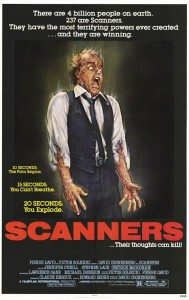

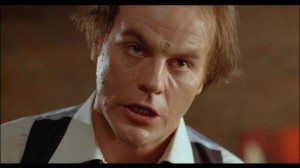
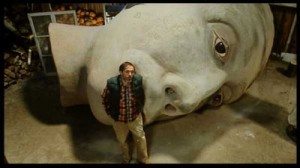


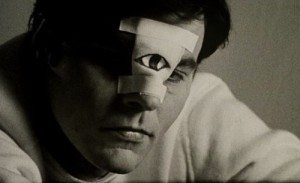
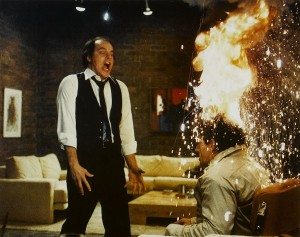
Nice commentary. I actually think Scanners is his best. Maybe not objectively, but it’s my personal favorite, at least.
There’s much to love in it. If I had to pick a Cronenberg favorite, it would have to be between Videodrome and Dead Ringers.
Dead Ringers is interesting, but something about it never quite worked for me. Maybe the end just didn’t satisfy me. I’ve seen it a couple times, but it’s been a while. Maybe one more viewing wouldn’t hurt. But after Scanners, Videodrome and The Fly are more or less tied for second place for me. After that, probably The Dead Zone. Then maybe Crash or eXistenz, though Spider and Shivers were both quite good, too.
Since Evil Genius observed that Scanners is relatively clunky and Videodrome is “too weird and messed up not to love,” I will say . . .
Yes. I agree. But I still prefer Scanners.
Scanners may be a bit clunky at times, but the story holds together. And it’s a great story. Videodrome may be a more polished and steady work in some purely cinematic respects, but the story doesn’t make much sense. Videodrome is like a tapestry of sequences with thematic links and some narrative through-line, but which doesn’t fully satisfy me as a story. I don’t really care what happens to James Woods in the movie, for example. I watch his story unfold with awe and excitement, but I’m always on the outside looking in. Scanners is a great story that I sink into without effort, and it has so many fantastic sequences and moments. Both films are great and unique, with unforgettable images. I guess I’d sum it up this way: Scanners is thrilling, whereas Videodrome is just provocative.
Perhaps, Jason, “always on the outside looking in” is how you’re supposed to feel watching Videodrome. It is, after all, a horror film about the corruption of voyeurism. The dissociative nature of it is what makes it frightening, albeit in a subtler way.
I think Videodrome is far from a ‘tapestry of sequences.’ It’s a very tight movie. It’s just that its perspective is Max Ren’s perspective, and he’s going insane. So neither he nor the audience always knows what’s real and what isn’t, until by the end the two merge, and what’s real and what isn’t are the same thing.
It’s precisely the same as Naked Lunch. A man goes mad, and we see it from his point of view. Both movies end identically.
That’s fair. I should watch it again. I remember it just as you describe. When I said it is “like a tapestry of sequences,” I was putting a lot of stress on the “like,” but I admit it wasn’t a good analogy. I guess the main thing is just that the story isn’t as compelling for me. It feels more like Cronenberg wanted certain images and sequences and the plot was developed afterwards. I have no idea if that’s how it was made. It’s just how it feels. It’s rather the opposite of a character-driven story, whereas Scanners is all about the characters.
I just watched Videodrome again. (It’s available for free online.) I actually like it less now. It’s still provocative, but it doesn’t work for me as much as when I was younger. On the level of plot, it’s rather a mess. It’s not that you don’t know what’s real–you can figure out more or less what’s real. It’s just that there’s not enough justification for what happens. SPOILERS AHEAD: Why was he “recruited”? To become an assassin? That’s hard to believe. Why him? Because of his television station? Well, then why have him kill his partners? They ruined any chances of using him to get their signal transmitted on the air. I guess we’re not supposed to know why they did anything, which means the film does not have a well-defined antagonist. And it’s very hard to care about the protagonist. So without any characters to appreciate, and with a plot that makes very little sense, the film only really works in the way it uses imagery to explore its themes. And the imagery is generally effective and memorable–except for the images of Mr. Convex when he dies, which are unintentionally hilarious.
Is it really about broadcasting a signal? Why was Max recruited? Maybe it’s all about Max in a way you’re still missing. Are you sure you know what’s real and what’s not?
It’s a rare soul who mid-discussion watches the movie in question. Thanks for checking it out (though I’m a bit dubious about watching a free copy online–you’re not telling me you watched it all as a youtube video, are you?–I recommend the Criterion bluray on a big-ass tv), sorry it didn’t do it for you.
Vimeo, not YouTube. I don’t have the luxury of being so particular. Anyway, it did occur to me that none of the exposition should necessarily be trusted, but that doesn’t change my point. I guess you could say that television porn/violence is the antagonist, that Max is going crazy from his addiction to it (and it is quite obviously likened to a drug in a number of clever ways in the film.) But then the nonsensical plot is just a ploy and we’re still not given much to really care about.
A valid way to view the film, Jason. I’ve always thought that the things you’re unengaged by are deliberate and effective; putting the viewer in Max’s position as sort of a meta-story. It is a violent, crazy, disorienting piece of film about a man made violent, crazy, and disoriented by film.
You are Max. Your confusion mirrors his. Your disassociation mirrors his. Please do not pull a gun out of your stomach vagina, though.
Thanks. I’ll try not to do that. By the way, did you hear about the Videodrom remake which I guess is in pre-production? I wonder how the symbolism will work out if they modernize it, since a stomach USB port probably won’t be nearly as suggestive.
I think I heard about that. It’s the best idea since the last worst idea I’ve ever heard. Which was that Seth Rogan is making an animated film called Sausage Party. I wonder if it will have any sex jokes in it? You know, about penises? I guess we’ll have to wait and see.